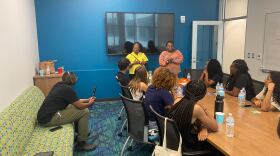My friends and I talk about how we keep tabs on our crushes. For most Generation Z folks, our whole lives are documented online, so it's easy to find personal information. My friends say, "Everyone lurks sometimes."
“I've definitely been real, real, real, real, real far in somebody's mama Facebook page,” said Morgan Jordan, a UNC junior.
“When does it get creepy?” I asked.
“When you get obsessive," she explained. "It shouldn’t be like, ‘I need to know what they’re doing right now, ahhh!’ Like, calm down. It's okay. Live your life."
It happens. Social media makes it easy to keep up with whoever you think is interesting. But when does it cross the line to become actual stalking?

Stalking is defined by repetitive harassment, said Valerie Pearce, Pitt County’s chief assistant district attorney. With decades of experience prosecuting stalking cases, she said most people don’t understand what the word really means.
“A lot of people think that it's like this creepy guy that's hanging out in an alley. And it's always a stranger. It has to be somebody physically following you around. And it does not have to be that,” Pearce explained.
Stalking is continuing to cross a boundary, especially after the person has asked you to stop, Pearce added. It can be the classic case of following someone around, or entirely online with unnerving comments, messages and posts.
I’ve experienced both. My friends saw it happen in real-time. They urged me to get help, but I kept excusing it as a long, weird list of coincidences.
According to the Centers for Disease Control and Prevention, 43% of college students who experience stalking write their situations off the same way. The federal agency also reports that one out of every six men and one out of every three women experience stalking at some point. Most victims are also between 18 and 25, just like me. But I still couldn't understand what caused the intense obsession that resulted in stalking.

The National Intimate Partner and Sexual Violence Survey (NISVS): 2016/2017 Report on Stalking.
I wanted to talk to someone who had been the stalker. I knew they were out there, but I had no idea where to find them. I scrolled through confessions on Reddit. I searched for support groups on Facebook and Google. After scouring YouTube, I finally found Leon Robert Walker Jr.
Walker is a Navy veteran, teacher and counselor based in Chicago. He uses his own experiences with narcissistic personality disorder to share advice through his videos online.
Two of his videos describe the time he stalked his girlfriend in the 1990s. He explained how he crossed the line from fixation to obsession.
“I had insecurities as a kid. I was afraid of girls when I was a kid,” Walker told me. “I built my ego up to be this OK kid, but then I joined the Navy and my ego got bigger and bigger and bigger and stronger and stronger. And then 'snap,' it got popped.”
Walker broke up with his girlfriend before going overseas. A year later, he returned to discover she moved on to another partner. He explained how that heartbreak sent him over the edge.

“I come back … not ready for her to be gone, not ready for her to be with another man, not ready to see her with somebody else. And so I lost it,” Walker said. “Y'all can laugh at me if you want to, but when you see a woman with another man … and she seems happy, happier than she was when you had her, you're gonna lose your mind. And it happens. I lost my mind."
He spiraled so far he couldn’t focus on anything else. He stopped brushing his teeth and bathing. He showed up at her job so often that he had multiple encounters with the police. Still, he said he was fixated on getting her back.
Dr. John Warren, a clinical psychologist who specializes in forensic evaluations, said sometimes the obsession can be psychological. Having some experience with stalking cases, Warren explained the neuroscience behind why someone might keep crossing boundaries.
“We know the reward system, the dopamine system is very often a big component in what we would say are, quote, addictive behaviors,” Warren said. “Stalking, especially at the lower level, but perhaps even at the delusional level — it's feeding that reward system somehow.”

While I was looking for support geared toward stalkers, I noticed that every resource focused on victims. This support is vital, but it’s reactive. Dr. Warren said we need to open the dialogue. Creating productive conversations may prevent someone from crossing the line.
“We don't create good environments for talking about strong feelings, unrequited love, what it means to bounce back from a loss of a relationship, being present with your own feelings,” Warren said.
Walker experienced this lack of support after he posted his first video on YouTube.
“People laughed at me, man … WorldStarHipHop got it. And they posted it. And people were laughing at me and joking and calling me that. Yeah, it was crazy,” Walker recalled.
Although he received pushback, Walker said he is starting a necessary conversation. Stalking isn’t just a joke — it’s real and it’s easier than ever with so much of our lives online.








